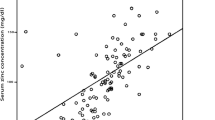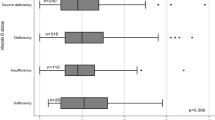Abstract
Zinc deficiency, which is common among Iranian populations, is believed to play a crucial role in the onset and progression of mood disorders such as depression in different stages of life. We have therefore investigated the relationship between serum/dietary zinc status and depression scores among adolescent girls living in northeastern Iran. Serum zinc was measured by flame atomic absorption (Varian AA240FS) and the mean zinc intake was assessed using 3-day food record. A validated Persian version of the Beck Depression Inventory (BDI) was used to determine the severity of depressive symptoms for all subjects. Data were analyzed using SPSS 18 software. There was a statistically significant correlation between dietary zinc intake and serum zinc concentration (r = 0.117, p = 0.018). Dietary intake of zinc (7.04 ± 4.28 mg/day) was significantly lower among subjects with mild to severe depression symptoms than those with no or minimal depression symptoms (8.06 ± 3.03 mg/day). Dietary zinc intake was inversely correlated with depression score (r = 0.133, p = 0.008). However, there was no significant difference in serum zinc concentrations among individuals with no or minimal and mild to severe depression symptoms (p = 0.5). Dietary zinc intake, but not serum zinc concentration, was inversely associated with depression symptoms. Therefore, controlled clinical trials are needed to determine the efficacy of zinc supplementation in the treatment of depression disorders.



Similar content being viewed by others
References
Amani R, Saeidi S, Nazari Z, Nematpour S (2010) Correlation between dietary zinc intakes and its serum levels with depression scales in young female students. Biol Trace Elem Res 137(2):150–158
McLoughlin I, Hodge J (1990) Zinc in depressive disorder. Acta Psychiatr Scand 82(6):451–453
Swardfager W, Herrmann N, Mazereeuw G, Goldberger K, Harimoto T, Lanctôt KL (2013) Zinc in depression: a meta-analysis. Biol Psychiatry 74(12):872–878
Swardfager W, Herrmann N, McIntyre RS, Mazereeuw G, Goldberger K, Cha DS, Schwartz Y, Lanctôt KL (2013) Potential roles of zinc in the pathophysiology and treatment of major depressive disorder. Neurosci Biobehav Rev 37(5):911–929
Szewczyk B, Kubera M, Nowak G (2011) The role of zinc in neurodegenerative inflammatory pathways in depression. Prog Neuro-Psychopharmacol Biol Psychiatry 35(3):693–701
Nowak G, Siwek M, Dudek D, Ziêba A, Pilc A (2003) Effect of zinc supplementation on antidepressant therapy in unipolar depression: a preliminary placebo-controlled study. Pol J Pharmacol 55(6):1143–1148
Szewczyk B, Poleszak E, Sowa-Kućma M, Wróbel A, Słotwiński S, Listos J, Wlaź P, Cichy A, Siwek A, Dybała M (2010) The involvement of NMDA and AMPA receptors in the mechanism of antidepressant-like action of zinc in the forced swim test. Amino Acids 39(1):205–217
Vergnano AM, Rebola N, Savtchenko LP, Pinheiro PS, Casado M, Kieffer BL, Rusakov DA, Mulle C, Paoletti P (2014) Zinc dynamics and action at excitatory synapses. Neuron 82(5):1101–1114
Nowak G, Legutko B, Szewczyk B, Papp M, Sanak M, Pilc A (2004) Zinc treatment induces cortical brain-derived neurotrophic factor gene expression. Eur J Pharmacol 492(1):57–59
Sowa-Kućma M, Legutko B, Szewczyk B, Novak K, Znojek P, Poleszak E, Papp M, Pilc A, Nowak G (2008) Antidepressant-like activity of zinc: further behavioral and molecular evidence. J Neural Transm 115(12):1621–1628
Rosa AO, Lin J, Calixto JB, Santos ARS, Rodrigues ALS (2003) Involvement of NMDA receptors and L-arginine-nitric oxide pathway in the antidepressant-like effects of zinc in mice. Behav Brain Res 144(1):87–93
Mahmoodi MR, Kimiagar SM (2001) Prevalence of zinc deficiency in junior high school students of Tehran City. Biol Trace Elem Res 81(2):93–103
Khayyatzadeh SS, Mirmoosavi SJ, Fazeli M, Abasalti Z, Avan A, Javandoost A, Rahmani F, Tayefi M, Hanachi P, Ferns GA (2017) High-dose vitamin D supplementation is associated with an improvement in several cardio-metabolic risk factors in adolescent girls: a nine-week follow-up study. Annals of clinical biochemistry
Trumbo P, Yates AA, Schlicker S, Poos M (2001) Dietary reference intakes: vitamin A, vitamin K, arsenic, boron, chromium, copper, iodine, iron, manganese, molybdenum, nickel, silicon, vanadium, and zinc. J Am Diet Assoc 101(3):294–301
Dozois DJ, Dobson KS, Ahnberg JL (1998) A psychometric evaluation of the Beck Depression Inventory–II. Psychol Assess 10(2):83–89
Beck AT, Ward CH, Mendelson M, Mock J, ERBAUGH J (1961) An inventory for measuring depression. Arch Gen Psychiatry 4(6):561–571
Ghassemzadeh H, Mojtabai R, Karamghadiri N, Ebrahimkhani N (2005) Psychometric properties of a Persian-language version of the Beck Depression Inventory-Second edition: BDI-II-PERSIAN. Depression and anxiety 21(4):185–192
Yary T, Aazami S (2012) Dietary intake of zinc was inversely associated with depression. Biol Trace Elem Res 145(3):286–290
Maserejian NN, Hall SA, McKinlay JB (2012) Low dietary or supplemental zinc is associated with depression symptoms among women, but not men, in a population-based epidemiological survey. J Affect Disord 136(3):781–788
Vashum KP, McEvoy M, Milton AH, McElduff P, Hure A, Byles J, Attia J (2014) Dietary zinc is associated with a lower incidence of depression: findings from two Australian cohorts. J Affect Disord 166:249–257
Ranjbar E, Kasaei MS, Mohammad-Shirazi M, Nasrollahzadeh J, Rashidkhani B, Shams J, Mostafavi S-A, Mohammadi MR (2013) Effects of zinc supplementation in patients with major depression: a randomized clinical trial. Iranian journal of psychiatry 8(2):73–79
Ranjbar E, Shams J, Sabetkasaei M, M-Shirazi M, Rashidkhani B, Mostafavi A, Bornak E, Nasrollahzadeh J (2014) Effects of zinc supplementation on efficacy of antidepressant therapy, inflammatory cytokines, and brain-derived neurotrophic factor in patients with major depression. Nutr Neurosci 17(2):65–71
Siwek M, Dudek D, Paul IA, Sowa-Kućma M, Zięba A, Popik P, Pilc A, Nowak G (2009) Zinc supplementation augments efficacy of imipramine in treatment resistant patients: a double blind, placebo-controlled study. J Affect Disord 118(1):187–195
Tahmasebi K, Amani R, Nazari Z, Ahmadi K, Moazzen S, Mostafavi S-A (2017) Association of mood disorders with serum zinc concentrations in adolescent female students. Biol Trace Elem Res 178(2):180–188
Salimi S, Kianpoor M, Abassi M, Abdani M, Moghaddam E (2008) Lower total serum protein, albumin and zinc in depression in an Iranian population. J Med Sci 8(6):587–590
Maes M, D'haese P, Scharpé S, D'Hondt P, Cosyns P, De Broe M (1994) Hypozincemia in depression. J Affect Disord 31(2):135–140
Bonaventura P, Benedetti G, Albarède F, Miossec P (2015) Zinc and its role in immunity and inflammation. Autoimmun Rev 14(4):277–285
Tayefi M, Shafiee M, Kazemi-Bajestani SMR, Esmaeili H, Darroudi S, Khakpouri S, Mohammadi M, Ghaneifar Z, Azarpajouh MR, Moohebati M (2017) Depression and anxiety both associate with serum level of hs-CRP: a gender-stratified analysis in a population-based study. Psychoneuroendocrinology 81:63–69
Shafiee M, Tayefi M, Hassanian SM, Ghaneifar Z, Parizadeh MR, Avan A, Rahmani F, Khorasanchi Z, Azarpajouh MR, Safarian H (2017) Depression and anxiety symptoms are associated with white blood cell count and red cell distribution width: a sex-stratified analysis in a population-based study. Psychoneuroendocrinology 84:101–108
Palta P, Samuel LJ, Miller ER 3rd, Szanton SL (2014) Depression and oxidative stress: results from a meta-analysis of observational studies. Psychosom Med 76(1):12–19
Sarandol A, Sarandol E, Eker SS, Erdinc S, Vatansever E, Kirli S (2007) Major depressive disorder is accompanied with oxidative stress: short-term antidepressant treatment does not alter oxidative–antioxidative systems. Hum Psychopharmacol Clin Exp 22(2):67–73
Prasad AS, Bao B, Beck FW, Kucuk O, Sarkar FH (2004) Antioxidant effect of zinc in humans. Free Radic Biol Med 37(8):1182–1190
Acknowledgements
This study was support by a grant from Mashhad University of Medical Sciences.
Author information
Authors and Affiliations
Corresponding authors
Ethics declarations
Conflict of Interest
The authors declare that they have no conflict of interest.
Rights and permissions
About this article
Cite this article
Gonoodi, K., Moslem, A., Ahmadnezhad, M. et al. Relationship of Dietary and Serum Zinc with Depression Score in Iranian Adolescent Girls. Biol Trace Elem Res 186, 91–97 (2018). https://doi.org/10.1007/s12011-018-1301-6
Received:
Accepted:
Published:
Issue Date:
DOI: https://doi.org/10.1007/s12011-018-1301-6




